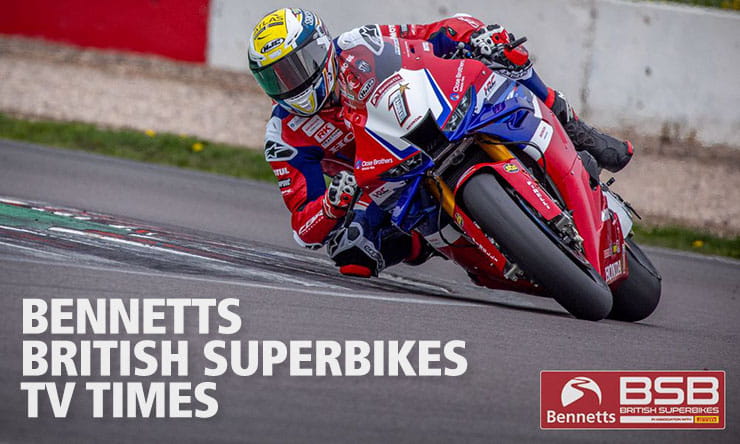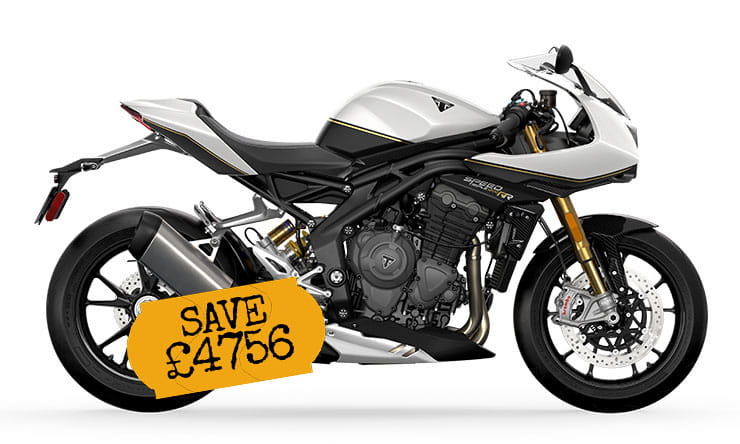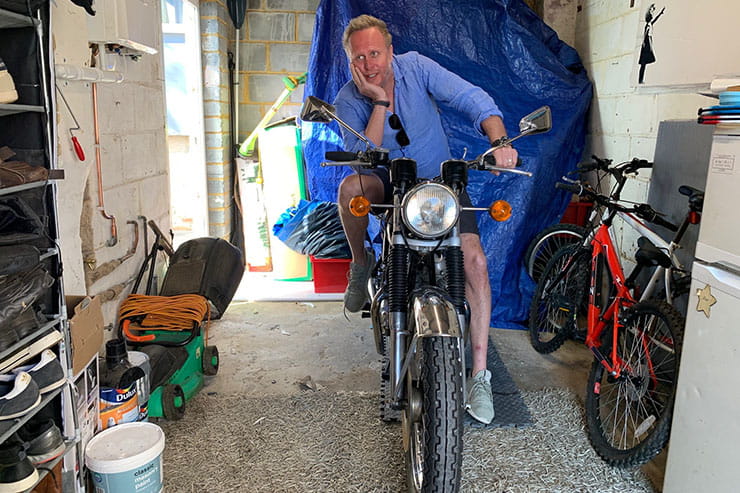
You loved your dad, he loved his bikes, but you know nothing about them. What do you do next?
The eight smart steps to selling an inherited motorcycle.
Meet Aaron. His dad, a lifelong motorcyclist passed away suddenly in 2016 leaving this beautiful Norton Commando to his family. Neither Aaron or his brother ride bikes or know a great deal about them. But they do know that the Norton meant a huge amount to their dad. Having come to the decision that it is better to let someone else enjoy this lovely bike than watch it decay through lack of use, they’ve decided to sell it.
As more of us hang onto our bikes for longer and biking isn’t as commonly passed down through the family, an increasing number of people are, sadly finding themselves in Aaron’s position. How do you manage the sale of something with enormous emotional value when you have little idea of its true condition, what it’s worth or the best route to make selling as painless and easy as possible? BikeSocial wants to help guide Aaron and his family through the process. Here’s our eight-point guide to getting it right.
Don’t rush into selling a motorcycle you inherit
Losing a relative is crushing. Emotions redline, rational thought disappears and in amongst the most horrific pain there are all kinds of decisions to be made, conversations to be had and affairs to be put in order. The only things you have to sort immediately concerning a vehicle are to inform the DVLA, inform the insurance company (because insurance and VED cease when the owner/keeper dies) and, if the vehicle (mostly applies to cars) is kept on the street someone will have to tax and insure it or move it off the road. The DVLA might require you to change the registered keeper and you’ll need to declare the bike SORN if it is less than 40 years old. Bikes older than 40 should already be on historic tax exemption and so will not need SORN.
Motorcycles are classed as ‘chattels’ which, in probate terms means they can be sold before probate is settled and no capital gains tax is due. But as we said above, we’d advise to let the dust settle and wait till the really important stuff is sorted.
Selling a classic motorcycle (or a collection of them) needs calm and some clarity of thought. It also needs time to gather things like paperwork, keys (for the bikes and their locks) and any spare parts together. Doing this will help get the best price with the least hassle.
So, once the DVLA and insurance are informed, forget about the bikes and deal with the stuff that matters most now.
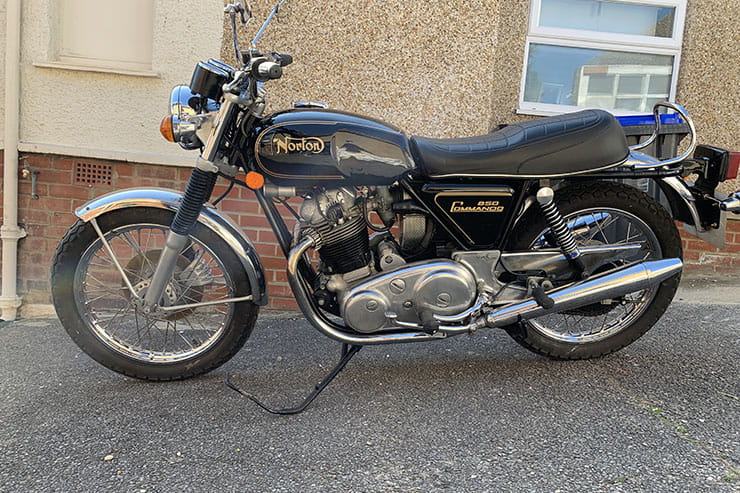
It says Norton on the fuel tank and Commando 850 on the side panels. But that’s not the whole story.
Do some research on the motorcycle you have inherited
If there’s only one or two bikes, it’s reasonably straightforward to get an idea of what you have and a rough indication of value. First job is to find all the paperwork. Riders are hoarders and chances are the folder of logbooks, old MoTs and insurance certificates will give much of the information you need. The value and desirability of old bikes can be fickle so look at the documents, work out roughly what the bike is (a 1974 Norton Commando MKIIA 850 in this case) and then look online at reviews, articles, and adverts for bikes for sale to get the last few details. For example, Aaron’s dad’s Norton is a 1974 MKIIA. Not the Interstate that had the bigger petrol tank (and reputation for unreliability) or the MKIII that had the electric start as standard and gear lever on the left-hand side. The MKIIA has a right-side gearshift (like most old British bikes), but this one has an aftermarket electric starter added as evidenced in the paperwork.
On most Norton Commandos there isn’t a huge difference in price between an early 750cc Fastback model and a MKIII 850, but on many bikes, like a 900cc 1970s Kawasaki there’s a big difference between the value of a 1973 Z1 and a 1976 Z900 even though they’ll look very similar to your kids.
If you’re lucky enough to have inherited a huge collection, you might need some expert help. And don’t assume that every (or any) bike there is worth large amounts of money. Motorcyclists are an emotional bunch and according to Ben Walker who runs the motorcycle department of Bonhams Auctions, “It’s not unusual to find a collection containing £40k Vincents, and £80k Brough Superiors alongside a £2000 BSA Bantam or Honda Cub that happened to be the deceased’s first ever bike.”
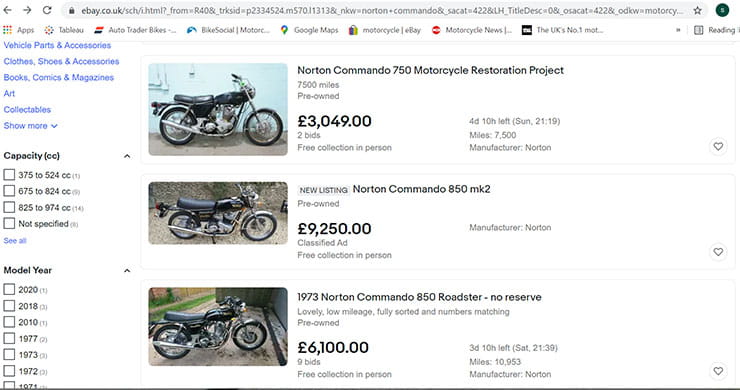
It’s never been easier to get an idea of the value of a motorcycle, but remember that asking prices on eBay can be very, er, ‘hopeful’.
Make it easy for your relatives to sell the motorcycle they inherit
‘My biggest fear is that when I die my wife will sell my bikes for the price I told her I paid for them.’
It’s the second-oldest biker joke out there, so make sure it doesn’t come true. Ben Walker from Bonhams again. “The best thing any rider or collector-of-classics can do is keep all the relevant paperwork together in one place. Along with the keys to the bikes and all the locks and security.
“I know it sounds terribly morbid, but imagine how you’d feel if after your death some cheeky dealer came round and offered your family a fraction of the bikes’ worth because they had no idea what they were selling? Make a list of the bikes and maybe even add some idea of value so they know what’s there. If you have something with particular value because of a celebrity connection or race/show success, make sure there are photos with the paperwork or magazine clippings etc. Provable provenance is everything in such cases. Simply telling someone it’s famous isn’t enough.
“And make sure all the spare parts are accessible too with a note on which ones might be rare or particularly valuable.”
It’s never been easier to get an idea of the value of things thanks to eBay etc, but also be aware that the buy-it-now prices in a private sale are asking prices and in some cases are wildly optimistic. Base your valuation on a typical price, not the highest. Prices at dealers tend to be more consistent and reflective of what a bike will sell for. Don’t forget though that in the classic world things like originality, even on a non-running, unrestored bike, can sometimes make it worth more than an expensively restored machine with new parts or stuff sourced from several machines. Just because Dad spent £11,000 having it restored doesn’t mean it’s worth £11k if others typically sell for £5k.
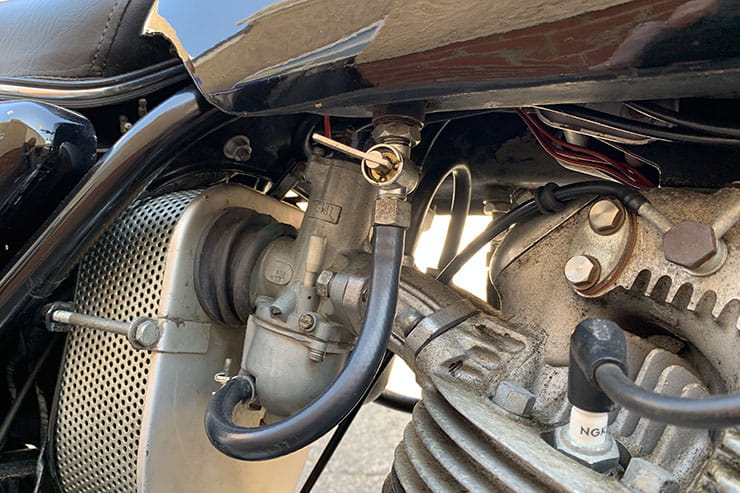
This bike hasn’t had its original carbs, airbox and points ignition uprated to modern items. That’s a good thing for collectors, but not always good for those buyers wanting to ride it regularly.
Seek help from the experts when selling an inherited motorcycle
“It’s not uncommon,” says Ben from Bonhams, “for people who knew the deceased to ‘pop round’ and start saying things like ‘He always wanted me to have his bike(s). we agreed a price of £1000 each’ etc.”
On many occasions these friends, their recollections and the prices they offer will be reasonable. But not always. Surely it’s better to have your loved one’s bikes go to his mates who will cherish and look after them? Because you have done your homework as we suggested above, you’ll be in a better place to make the right decision. Any price agreed a few years back is probably going to be a bit shy of the current value and any truly respectful mate will understand this and expect to pay a little more.
This is why you need to let the dust settle and do that research when the time is right.
And, of course, the genuine friends can be really helpful as you prepare the bikes for sale. They can come along and help kick some life into engines that have been stood a while. They can help charge the batteries, pump up the tyres, get the bikes running as well as possible. And if the trade-off is that they get pick of the collection for a bit of a discount? That’s what friends are for.

The rear shocks have been replaced with quality aftermarket items, but the battery and tyres are past their best and it needs some work before sale
Selling an inherited motorcycle to a dealer
The quickest and easiest way to sell a bike is to call a specialist classic bike dealer. Definitions of ‘classic’ vary massively - we’d call anything more than 30 years old a classic, but there are plenty of bikes younger than that with some added value through rarity and plenty of older ones that classic dealers aren’t really interested in. Thankfully, the bike world is a close community and if one dealer isn’t interested in your dad’s 1976 Honda because they specialise in Italian classics, chances are he’ll have a mate in the trade who is.
The ‘Webuyanyofallyourmotorbikes’ type websites are rarely the right place for selling a classic. They tend to prefer bikes less than 20 years old. Search online for classic bike dealers in your area and have a look at their websites and social media. Don’t be afraid to call or email the editors of classic bike magazines and ask for recommendations of good dealers near you. They are all enthusiasts and will know many of the traders personally and who to recommend.
Dealers always prefer a quick sale so they’ll hope a bike is running, in good order and ready to go. Most inheritance bikes are suffering from lack of use and recommissioning will cost the dealer a few hours’ workshop time, a pair or replacement tyres, new battery and fluids. About £500 at retail prices. But they also have to offer some kind of warranty and pay VAT on the sale so don’t expect them to give you £9000 on a bike they’ll be selling for £10k.
In the case of a low-mileage, two-owner-from-new 1974 Norton Commando like this one, which, if running perfectly and ready to go would be worth around £10k, we’d expect a dealer to offer around £7000-8000 because the tank is a bit rusty, the carbs will need a clean, the aftermarket electric start isn’t working and the tyres and battery will need replacing.
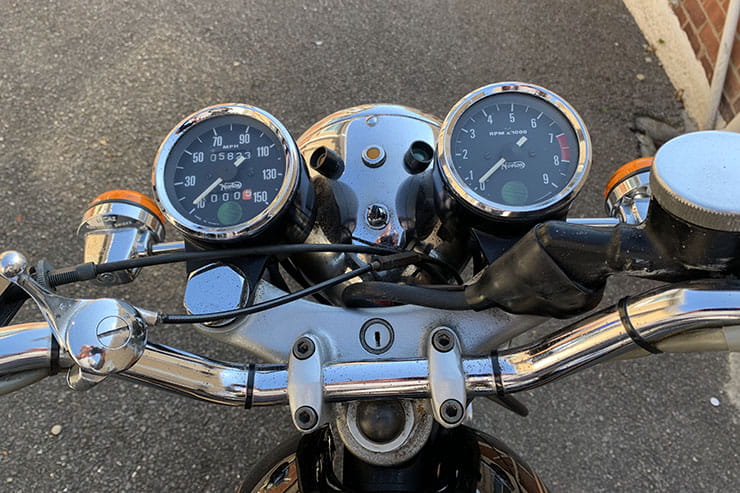
Less than 6000 miles in 47 years. A genuine low mileage Norton Commando is worth decent money to the right buyer so take your time to find them
Selling an inherited bike privately
Private selling has never been easier because websites like eBay put your bike in front of a national audience and some of the Facebook enthusiast groups for a particular make and model broaden that audience to international. The upsides are that you are the one selling for retail price, not the dealer, so, in theory you make more money. The downsides are that you have to take the pics, write the ad, pay for the advert (and fees for eBay and Paypal) and be prepared for dozens of timewasters, hundreds of frustrating questions and the chance that the winning buyer doesn’t turn up (a sadly frequent occurrence).
Plus, you’ll need to be around when people come to view and get the bike running properly or accept that you’ll get much less than it’s worth. And there’s the worry that the bike will get stolen once a thief knows your address or they’ll pay with fake cash or a dodgy bankers draft. And also that what you see as an emotional connection with your dad is just another piece of metal to them.
Realistically, by the time you’ve got the bike running, paid for the advert and fees and been haggled down on price you might come away with £500-1000 more than selling to a dealer. Whether the hassle is worth the gain is up to you.
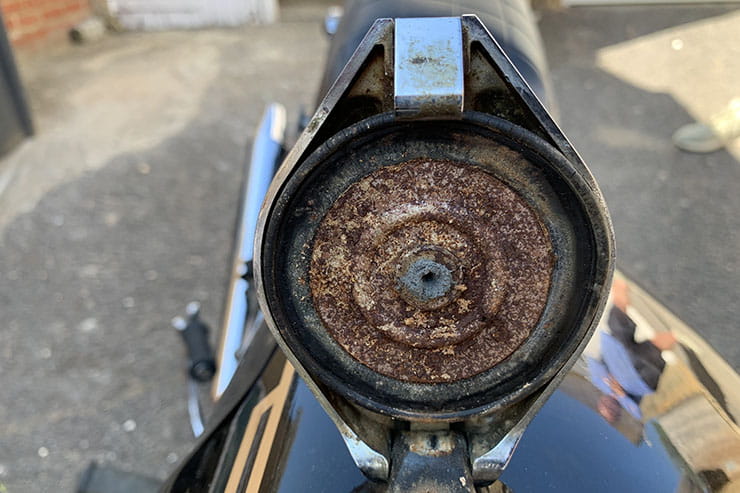
Rusty fuel tanks, gummed-up carbs and perished fuel lines will put many buyers off, but some collectors actually pay more for such ‘originality’.
Selling an inherited motorcycle at auction
If you inherit a collection of bikes, then selling through a reputable auction company is often the easiest way to sell and make the most return. The biggest auction houses have lists of clients looking for particular models, but they also have a broad enough range of bikes at each sale to attract a wide selection of different bidders.
The cast-iron classics (Vincents, BSA Gold Stars, Brough Superiors and race bikes with proven history and provenance) will always sell for good money. Emerging classics (Japanese bikes of the 1970s and 80s) generally do well, but there can be some bargains, which attracts canny buyers, collections of spares for the above bike and memorabilia can be surprisingly valuable and vehicles once owned by a celebrity generally make more money at an auction than they would in a private sale or at a dealer.
The upsides are that, perversely, a lot of the wealthier collectors prefer original, unrestored bikes to rebuilt show-ponies so you won’t need to recommission the bikes. A good auction house generates lots of interest in advance of the sale to get the right buyers in the room and a good auctioneer is capable of getting two or more nostalgic buyers to pay the best possible price and enjoy the process of doing it.
For sellers, the downside is paying a substantial fee to the auction house, plus the risk your bike (or one of the bikes in the collection) doesn’t sell or reach reserve price. Setting the reserve price is crucial. The auction company’s job is to attract the most potential buyers which means they prefer to set a lower reserve and quote a low estimated sale price in the catalogue because it draws people into the sale room, thinking they’ll get a bargain.
In the case of Aaron’s Norton, auction is a good option because the bike has done less than 6000 miles from new, is almost completely original with just two owners. Oh, and it has a celebrity connection because Aaron’s dad was Keith Emerson, legendary keyboard player with Emerson, Lake & Palmer.

70s rock legend Keith Emerson was also a lifelong motorcyclist and Norton owner. (Image: Surka - Own work, CC BY 3.0, https://commons.wikimedia.org/w/index.php?curid=8345595)
Selling a motorcycle with a celebrity connection
In the early 1970s, Emerson, Lake & Palmer were probably the biggest rock band on the planet. They sold tens of millions of albums, filled countless American football stadiums and were a bigger concert draw than pretty much anyone apart from Led Zeppelin. Things changed pretty rapidly in the late 1970s when punk pulled the rug from most of the progressive bands, but for a certain generation of classic bike fans Keith Emerson is a big name. Keith was also a lifelong motorcyclist and well-known Norton enthusiast. He bought this particular Norton in 1984 after his beloved 1972 Commando had been stolen.
So how much value does a 1970s rock star add to the price of a classic bike. We spoke to three classic bike dealers who all agreed that the answer is ‘not as much as you’d think’.
“Unless the previous owner was Steve McQueen or a legendary bike racer, you’re looking at a few hundred quid at most,” was the view of Chris Mayhew from Lusso Veloce in Leicester. He added, “What that connection does do is make a bike easier to sell because everyone loves a story they can tell at the bike meet. But in terms of price, for a dealer, it’s negligible.”
Chris agreed with the other dealers we spoke to though that in an auction though, celebrity ownership can make a real difference to the price. All it takes is two wealthy fans who’d both love to own something special that belonged to their hero. Usually, the most valuable items are the recognisable clothing, or props or vehicles from a film or TV show. One of the more direct dealers we spoke to described it like this. “You’d happily pay a lot of money for David Beckham’s football boots, but no one would pay over the odds for his toaster or TV.”
Ben from Bonhams had some better examples. “The outfit David Bowie was wearing in his last appearance as Ziggy Stardust has no actual value as a piece of material but would sell for tens if not hundreds of thousands of pounds at auction. In the world of a collector it’s all about recognition – a memory from a poster on a wall, an album cover or movie we loved.”
Keith Emerson’s Norton is an interesting machine. He wasn’t your average celebrity motorcyclist, but a genuine motorcycle enthusiast and there’s a good chance that this bike meant more to him than many of the instruments, awards and paraphernalia he collected along the way. Aaron knows that while Keith didn’t ride the Norton all that much (he lived most in America and had other bikes out there that got more use) he would never have sold it because it’s a Norton and there was a connection that we riders all understand.
Ben Walker understands this. “Commandos are increasing in value and the MKIIA is regarded by many as the best of the bunch. As a low mileage, original and pretty-much immaculate example, this bike has significant value anyway. Many of the big collectors in the classic bike world are of an age where they would have been aware of Keith’s music in his heyday and they will understand what this bike meant to him. In relative terms they could grab a bike they want with a sprinkle of celebrity coating for not that much money compared to other classic machines.”
Keith’s Norton Commando sold at the Bonhams sale at the Stafford International Classic Bike Show on July 4th 2021 for £12,650.












